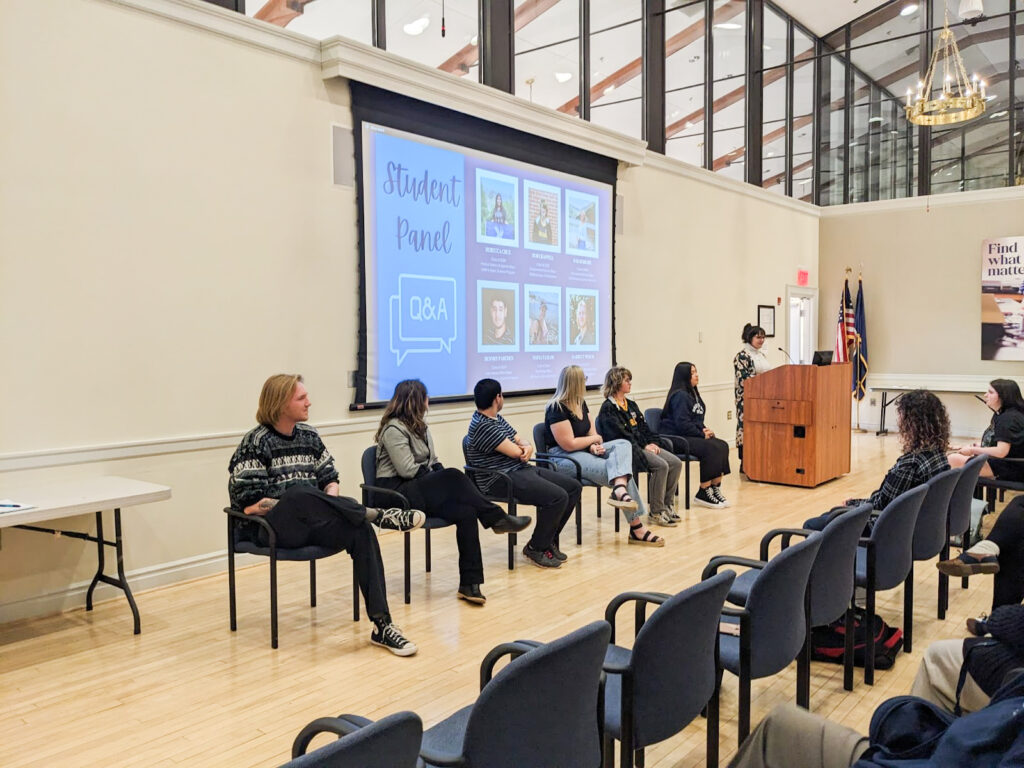Student panelists talk on experiences studying abroad, scholarship eligibility and budgeting tips when traveling
3 min read
All six panelists raised their hands when asked if they received some type of scholarship to study abroad. | Photo courtesy of Sofia Taylor.
by JOSSELINE DELGADO POZO
Staff Writer
“By a show of hands, how many of you received some type of scholarship to study abroad?” asked UMW Education Abroad Coordinator Caitie Cavalier at the UMW Voices of Diversity panel on March 20.
All six panelists raised their hands. Representing various majors and study abroad trips, the students reflected on their study abroad experiences, focusing on budgeting for a trip abroad as well as the struggles they faced and overcame during their studies in a foreign country.
The panelists addressed many of the worries that people have while considering traveling to another country. One of the largest obstacles they identified was not having enough money to cover the costs of the trips.
The Center for International Education at UMW offers the UMW Education Abroad Scholarships that are provided by UMW in addition to Approved Program Scholarships from program-specific education abroad providers or international institutions. They also offer information on external scholarships, such as the U.S. Department of State’s Benjamin A. Gilman International Scholarship. According to their website, the scholarship “enables students of limited financial means to study or intern abroad, providing them with skills critical to our national security and economic prosperity.” To be eligible for the Gilman, students must receive the Federal Pell Grant.
“I was eligible to apply for the Gilman Scholarship and I was awarded that one,” said senior political science major Rebecca Cruz. “The remaining balance was covered by my financial aid [from] FAFSA.”
Panelists also stressed the importance of learning the currency exchange rate when traveling to another country.
Garrett Welch, a senior secondary education major, was under the impression that he knew the exchange rate when he traveled abroad, and he even thought he was under budget.
“I had it backwards and realized when I got home, and I went that number is not right,” he said, relaying his story as a word of caution to the audience.
Senior international business major Sarah Higbie also advised students to pay attention to their bank when it comes to international fees.
“If you’re using a U.S. credit card or debit card, make sure your bank doesn’t have international fees for every purchase that you make because that adds up,” she said.
The panelists recommended researching what each program offers outside of the host city at a reduced cost, such as the opportunity to go out and explore.
“One thing that I found was helpful was that there was a community garden right off campus, a lot of times they had a food pantry,” said Bob Chappel, a junior environmental science major. “So, every week when I would go there and volunteer for hours, I would grab a little bit of food to take home, and that’s what I would base my meals for the week around.”
There are a number of possibilities for UMW students to take part in an international experience. From exchange, faculty-led and approved programs to conducting research abroad, internships and volunteering, the trips accommodate students who want to immerse themselves in the country’s culture for an entire semester or year, as well as those who prefer shorter trips over the summer or during breaks. Credits that students take while studying abroad will transfer as a UMW equivalent, general elective, or major elective course, so students can work towards completing their degree while abroad.
Higbie served as a planning intern for Ireland’s Department of Housing, Local Government and Heritage. She worked Monday to Thursday from 9 a.m.–3 p.m., and her team worked remotely one day of the week.
“I got to meet with different government delegations from Italy, Malta, France, Scotland, England—a lot of them, and it was a good experience,” she said.
Overall, the students stressed the importance of preparing for an international trip and recommended that students take advantage of all their host country has to offer.
“When students go abroad, they are accurately representing the United States of America and all of our diversity that we have here,” said Cavalier.











